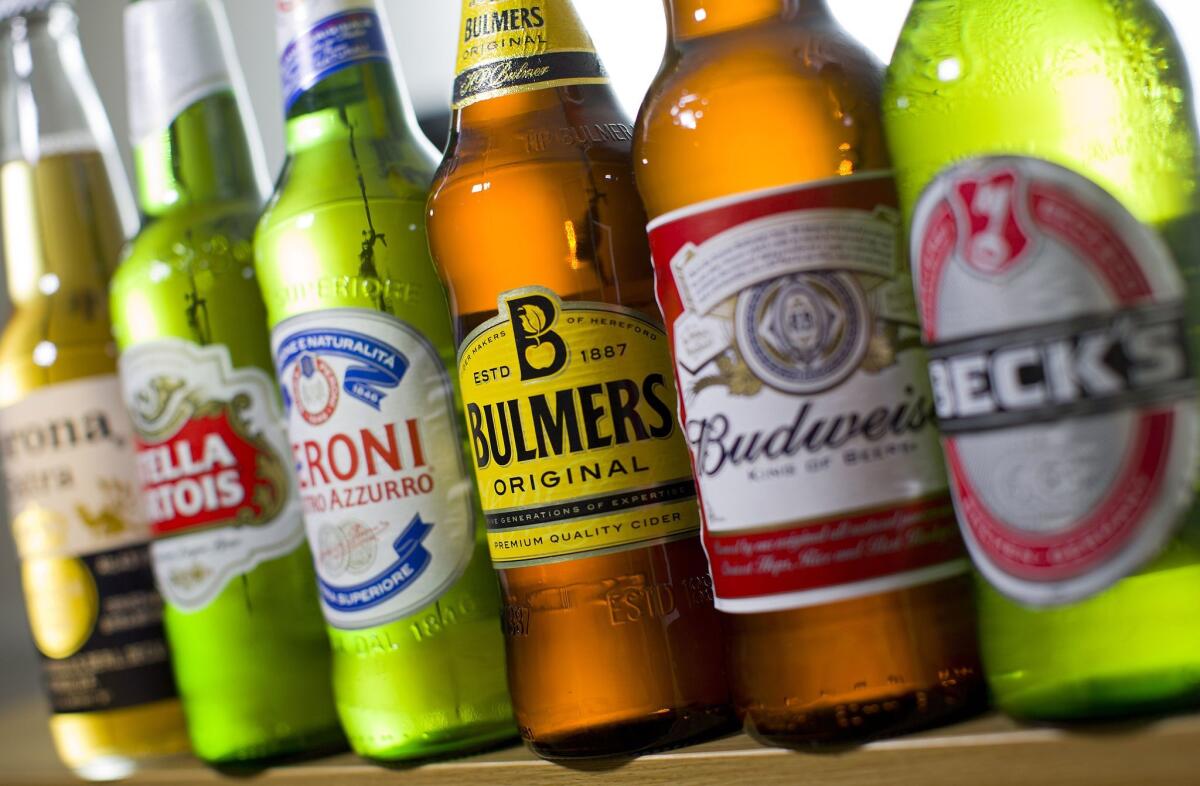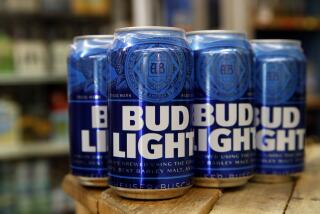SABMiller agrees in principle to buyout offer from Budweiser owner AB InBev

Beer giants Anheuser-Busch InBev and SABMiller said Tuesday they had agreed in principle to key terms of a potential takeover offer.
- Share via
Beer giants Anheuser-Busch InBev and SABMiller are one step closer to becoming a brewing behemoth.
In what could be the biggest deal in beer industry history, the world’s two largest brewers said Tuesday that they had reached an agreement in principle on the key terms of a potential takeover offer by AB InBev after weeks of haggling.
The new company would control 29% of the global beer market, making it more than three times bigger than its closest rival, Heineken, according to estimates from research firm Euromonitor. In the U.S., AB InBev has 45% volume share and MillerCoors, a joint venture between SABMiller and Molson Coors Brewing Co., controls 28%.
Under the terms of the potential offer, shareholders of London-based SABMiller would receive about $67 per share in cash. A partial share alternative available for about 41% of SABMiller’s shares would offer about $59.52 per share.
The value of SABMiller equity at the bid price is $110 billion. Dealogic pegged the value at about $117 billion, including the assumption of about $11 billion in debt, making it the third-biggest global acquisition ever.
The offer is a 50% premium to SABMiller’s share price on Sept. 14, the last business day before speculation began about Belgium-based AB InBev’s interest in the company.
SABMiller’s board has indicated to AB InBev that it would be “prepared unanimously to recommend” the offer to shareholders, a statement released by both companies said.
Meanwhile, the board of AB InBev “fully supports” the terms of the potential offer, the statement said.
“This is a move that’s mutually beneficial,” said Nick Petrillo, industry analyst for IBISWorld. “It’s going to allow these two companies to expand their outreach throughout the entire developed world.”
AB InBev has been particularly interested in expanding into Africa and India, places where SABMiller already has a presence, he said. For SABMiller, the lure is AB InBev’s massive brand portfolio, which is globally popular and can help it appeal to more markets.
What’s not a factor in this potential deal is the U.S. market, which has limited growth potential other than craft beer, Petrillo said. AB InBev has realized this and acquired several popular craft brewers such as Chicago’s Goose Island Beer Co. to offset the decline in its core brands.
“Both can agree that the U.S. as a market in general is just not a major concern for them,” Petrillo said. “And it’s because of that ... that AB InBev was probably prompted to do this.”
The combination probably will be subjected to intense scrutiny from antitrust regulators, both in the U.S. and abroad.
AB InBev makes more than 200 beers, including Budweiser and Stella Artois, and operates in 25 countries. SABMiller also makes more than 200 beers, including Miller Genuine Draft, and has operations in more than 80 countries.
Regulators will look at the competitiveness of each market where the two companies would overlap, as well as the combined global market share, said Aviv Nevo, a professor of economics and marketing at the Kellogg School of Management at Northwestern University.
In the U.S., analysts expect that SABMiller will have to sell its 58% stake in MillerCoors to get antitrust approval. AB InBev has already gotten a taste of regulatory mandates when it acquired Mexican beer company Grupo Modelo two years ago and was required to sell the rights for all Modelo brands in the U.S.
The proposed acquisition probably won’t result in higher prices for beer drinkers because several recent price promotions around the country by large brewers did not result in a bump in volume, said Carlos Laboy, global beverage sector head at HSBC.
Consumer rights group Food & Water Watch urged the Justice Department to block the buyout.
“This merger is the latest in a wave of mergers between food and beverage corporations and will squeeze smaller, independent beer companies out of grocery and liquor stores, limiting competition and consumer choice,” Executive Director Wenonah Hauter said in a statement. “Like other mergers, this one upholds the illusion of consumer choice while stifling innovation and bolstering already wealthy and powerful corporations.”
Beyond just beer market share, regulators will also look at other products, such as nonalcoholic beverages and distribution agreements, said Kyle Leingang, a corporate attorney at Dorsey & Whitney who has worked with mergers and acquisitions in the beer sector.
“From the perspective of other craft brewers out there, I think they’re going to be concerned about how the distribution side of things plays out more than anything else,” Leingang said. Regulatory approval could take as long as a year, he said.
Tom McCormick, executive director of the California Craft Brewers Assn., said AB InBev’s proposed bid for SABMiller has made members concerned.
“At the very least, it establishes the critical need to preserve self-distribution for small brewers and demonstrates the need to preserve and protect a fair and equal marketplace,” McCormick said.
In the proposed offer, AB InBev said it would agree to a “best efforts” commitment to obtain any regulatory clearances necessary to close the transaction. The company also said it would agree to pay a $3-billion fee to SABMiller if the transaction failed to close because of inability to get regulatory clearances or the approval of AB InBev shareholders.
AB InBev’s thirst for companies might not end with SABMiller.
HSBC’s Laboy said the “acquisitive” beverage giant could set its sights next on the soft drink industry. AB InBev already has ties with PepsiCo Inc., while SABMiller has a majority stake in Coca-Cola Beverages Africa, the largest Coca-Cola bottler on the continent.
“I think this transaction probably marks the end of the great beer deals that needed to get done,” he said. “The whole soft drink angle is incredibly strategic. That’s where they’re going next.”
For more business news, follow @smasunaga.
More to Read
Inside the business of entertainment
The Wide Shot brings you news, analysis and insights on everything from streaming wars to production — and what it all means for the future.
You may occasionally receive promotional content from the Los Angeles Times.











